Understanding Organizational Change and Its Management Challenges
VerifiedAdded on 2020/04/15
|7
|1014
|44
AI Summary
This document explores the concept of organizational change, emphasizing its necessity due to factors like competition and changing business trends. It discusses how organizations appreciate the scale and scope of changes by analyzing other successful implementations. The assignment further investigates reasons for failures in change programs, highlighting issues such as poor communication and lack of resources, illustrated with examples from companies like Toyota and Coles. Overall, it provides a comprehensive view of the challenges and strategies involved in managing organizational change.

Running head: MANAGEMENT OF CHANGE
Management of Change
Name of Student
Name of University
Author Note
Management of Change
Name of Student
Name of University
Author Note
Paraphrase This Document
Need a fresh take? Get an instant paraphrase of this document with our AI Paraphraser
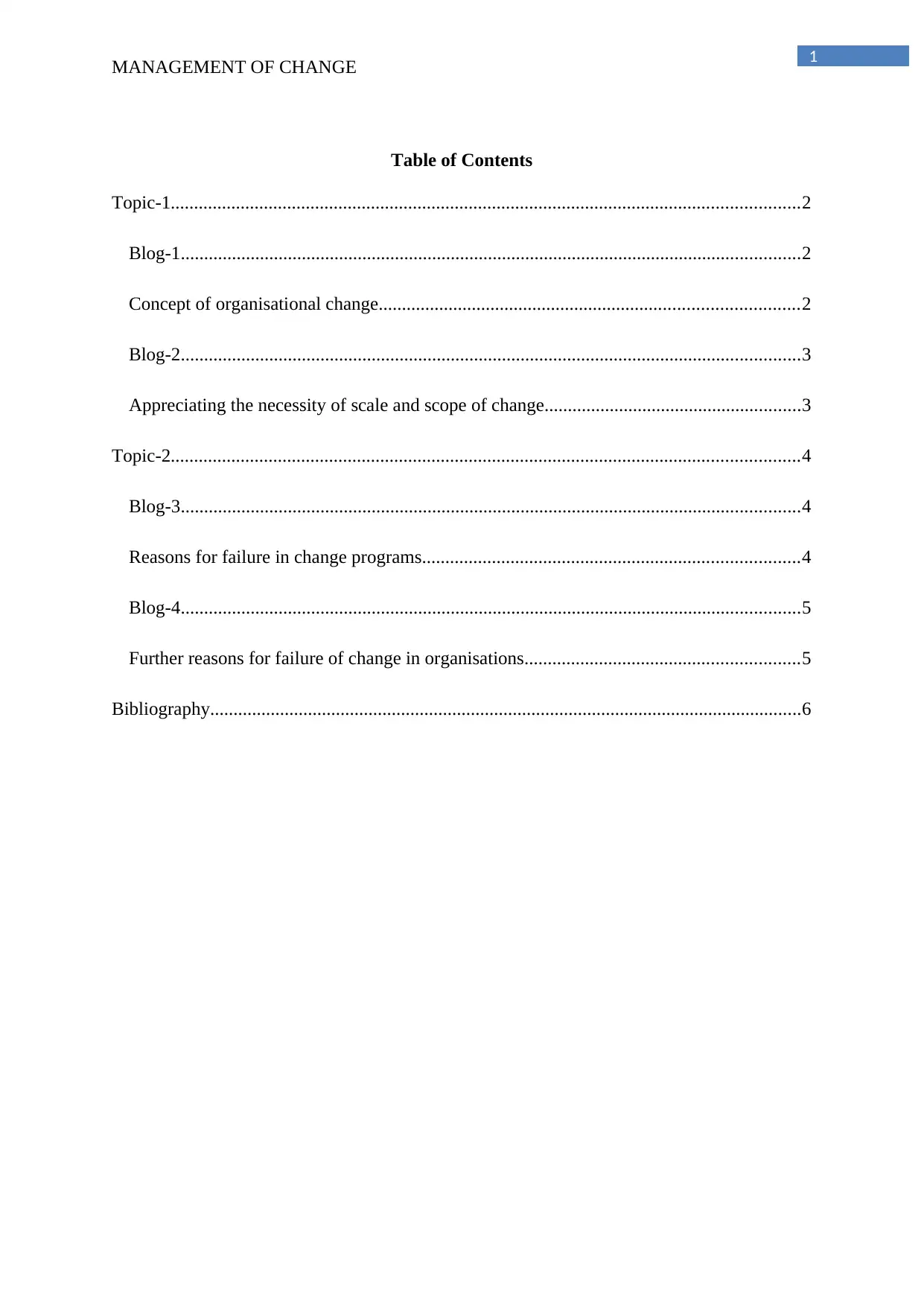
1
MANAGEMENT OF CHANGE
Table of Contents
Topic-1.......................................................................................................................................2
Blog-1.....................................................................................................................................2
Concept of organisational change..........................................................................................2
Blog-2.....................................................................................................................................3
Appreciating the necessity of scale and scope of change.......................................................3
Topic-2.......................................................................................................................................4
Blog-3.....................................................................................................................................4
Reasons for failure in change programs.................................................................................4
Blog-4.....................................................................................................................................5
Further reasons for failure of change in organisations...........................................................5
Bibliography...............................................................................................................................6
MANAGEMENT OF CHANGE
Table of Contents
Topic-1.......................................................................................................................................2
Blog-1.....................................................................................................................................2
Concept of organisational change..........................................................................................2
Blog-2.....................................................................................................................................3
Appreciating the necessity of scale and scope of change.......................................................3
Topic-2.......................................................................................................................................4
Blog-3.....................................................................................................................................4
Reasons for failure in change programs.................................................................................4
Blog-4.....................................................................................................................................5
Further reasons for failure of change in organisations...........................................................5
Bibliography...............................................................................................................................6
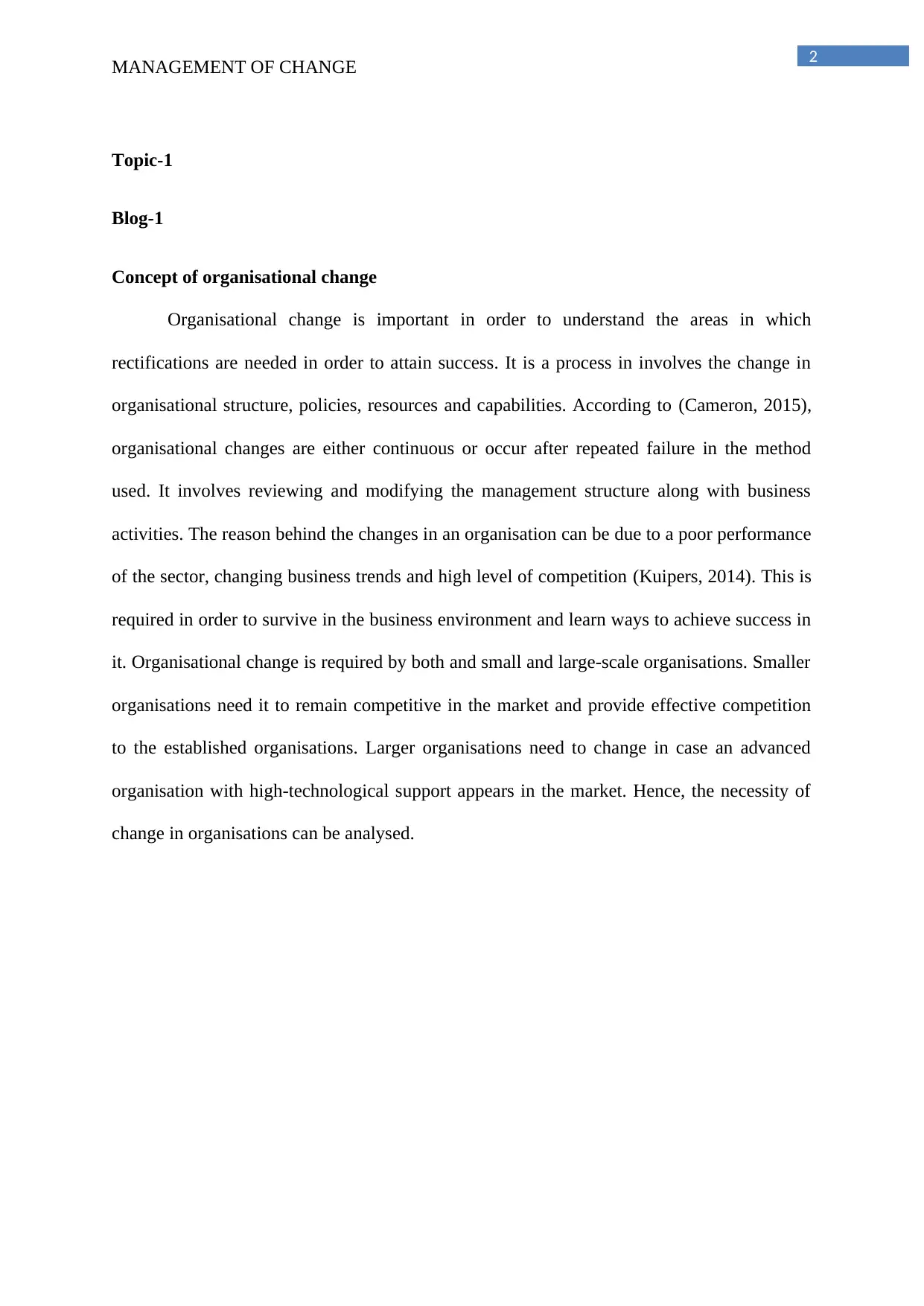
2
MANAGEMENT OF CHANGE
Topic-1
Blog-1
Concept of organisational change
Organisational change is important in order to understand the areas in which
rectifications are needed in order to attain success. It is a process in involves the change in
organisational structure, policies, resources and capabilities. According to (Cameron, 2015),
organisational changes are either continuous or occur after repeated failure in the method
used. It involves reviewing and modifying the management structure along with business
activities. The reason behind the changes in an organisation can be due to a poor performance
of the sector, changing business trends and high level of competition (Kuipers, 2014). This is
required in order to survive in the business environment and learn ways to achieve success in
it. Organisational change is required by both and small and large-scale organisations. Smaller
organisations need it to remain competitive in the market and provide effective competition
to the established organisations. Larger organisations need to change in case an advanced
organisation with high-technological support appears in the market. Hence, the necessity of
change in organisations can be analysed.
MANAGEMENT OF CHANGE
Topic-1
Blog-1
Concept of organisational change
Organisational change is important in order to understand the areas in which
rectifications are needed in order to attain success. It is a process in involves the change in
organisational structure, policies, resources and capabilities. According to (Cameron, 2015),
organisational changes are either continuous or occur after repeated failure in the method
used. It involves reviewing and modifying the management structure along with business
activities. The reason behind the changes in an organisation can be due to a poor performance
of the sector, changing business trends and high level of competition (Kuipers, 2014). This is
required in order to survive in the business environment and learn ways to achieve success in
it. Organisational change is required by both and small and large-scale organisations. Smaller
organisations need it to remain competitive in the market and provide effective competition
to the established organisations. Larger organisations need to change in case an advanced
organisation with high-technological support appears in the market. Hence, the necessity of
change in organisations can be analysed.
⊘ This is a preview!⊘
Do you want full access?
Subscribe today to unlock all pages.

Trusted by 1+ million students worldwide
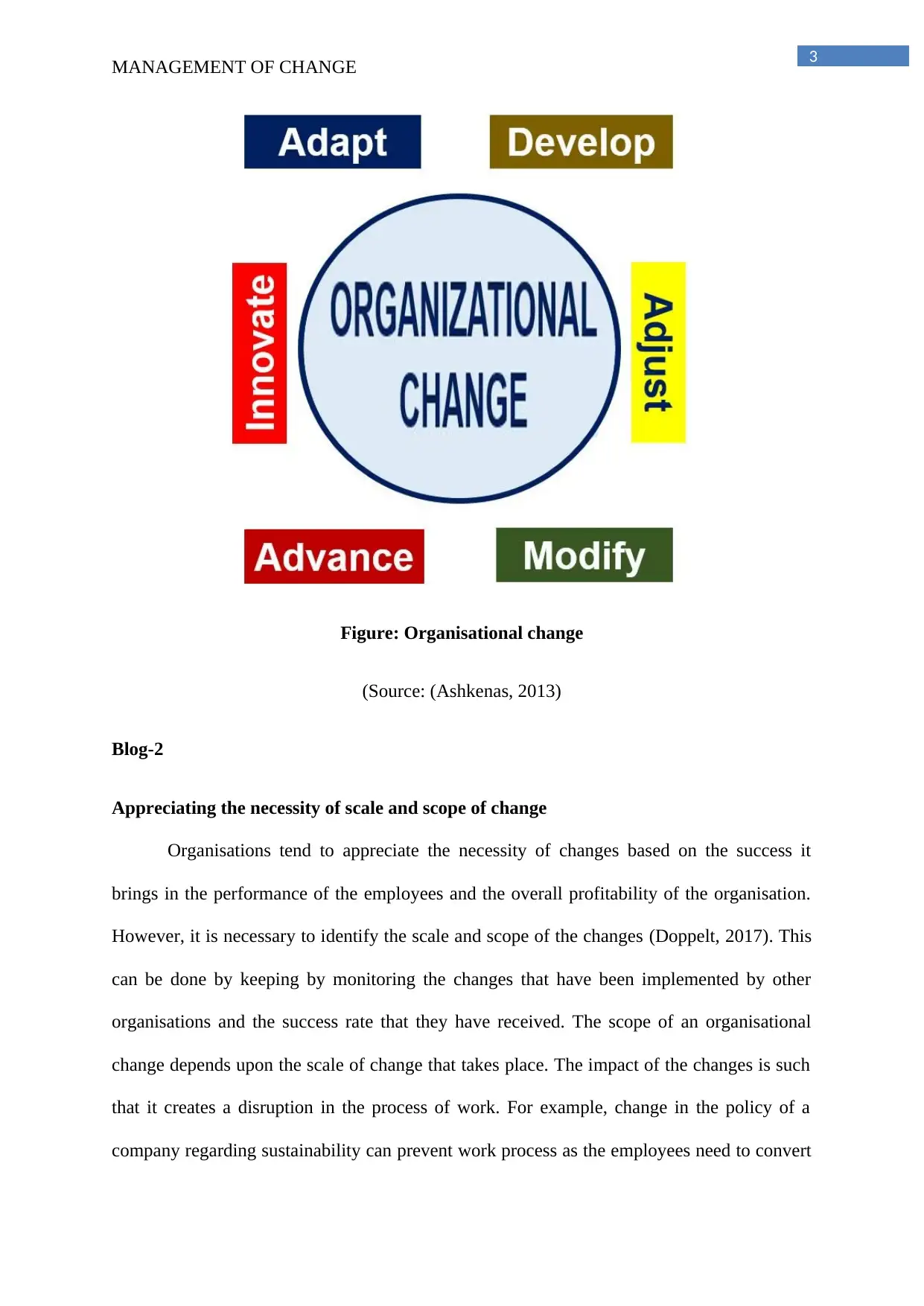
3
MANAGEMENT OF CHANGE
Figure: Organisational change
(Source: (Ashkenas, 2013)
Blog-2
Appreciating the necessity of scale and scope of change
Organisations tend to appreciate the necessity of changes based on the success it
brings in the performance of the employees and the overall profitability of the organisation.
However, it is necessary to identify the scale and scope of the changes (Doppelt, 2017). This
can be done by keeping by monitoring the changes that have been implemented by other
organisations and the success rate that they have received. The scope of an organisational
change depends upon the scale of change that takes place. The impact of the changes is such
that it creates a disruption in the process of work. For example, change in the policy of a
company regarding sustainability can prevent work process as the employees need to convert
MANAGEMENT OF CHANGE
Figure: Organisational change
(Source: (Ashkenas, 2013)
Blog-2
Appreciating the necessity of scale and scope of change
Organisations tend to appreciate the necessity of changes based on the success it
brings in the performance of the employees and the overall profitability of the organisation.
However, it is necessary to identify the scale and scope of the changes (Doppelt, 2017). This
can be done by keeping by monitoring the changes that have been implemented by other
organisations and the success rate that they have received. The scope of an organisational
change depends upon the scale of change that takes place. The impact of the changes is such
that it creates a disruption in the process of work. For example, change in the policy of a
company regarding sustainability can prevent work process as the employees need to convert
Paraphrase This Document
Need a fresh take? Get an instant paraphrase of this document with our AI Paraphraser
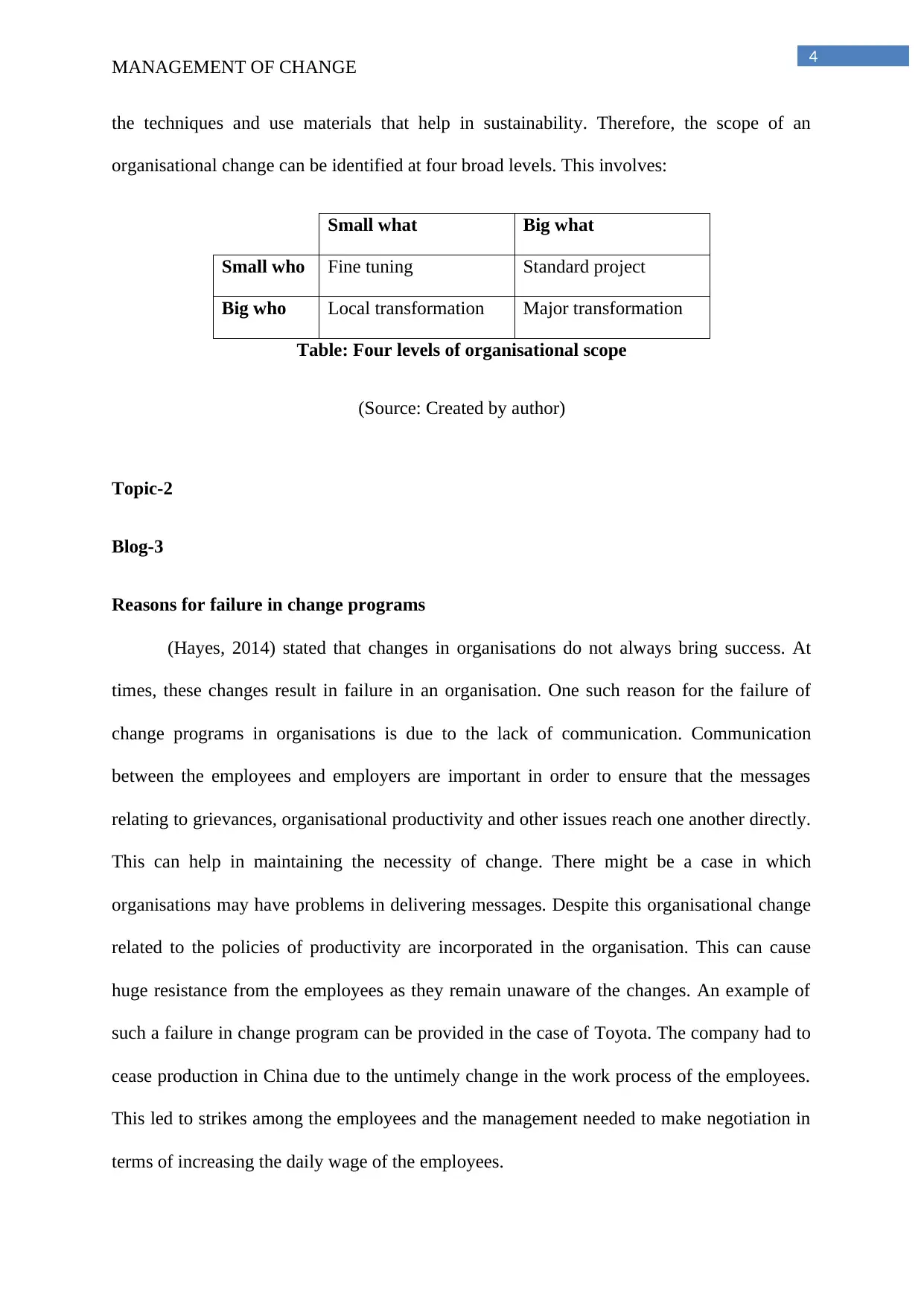
4
MANAGEMENT OF CHANGE
the techniques and use materials that help in sustainability. Therefore, the scope of an
organisational change can be identified at four broad levels. This involves:
Small what Big what
Small who Fine tuning Standard project
Big who Local transformation Major transformation
Table: Four levels of organisational scope
(Source: Created by author)
Topic-2
Blog-3
Reasons for failure in change programs
(Hayes, 2014) stated that changes in organisations do not always bring success. At
times, these changes result in failure in an organisation. One such reason for the failure of
change programs in organisations is due to the lack of communication. Communication
between the employees and employers are important in order to ensure that the messages
relating to grievances, organisational productivity and other issues reach one another directly.
This can help in maintaining the necessity of change. There might be a case in which
organisations may have problems in delivering messages. Despite this organisational change
related to the policies of productivity are incorporated in the organisation. This can cause
huge resistance from the employees as they remain unaware of the changes. An example of
such a failure in change program can be provided in the case of Toyota. The company had to
cease production in China due to the untimely change in the work process of the employees.
This led to strikes among the employees and the management needed to make negotiation in
terms of increasing the daily wage of the employees.
MANAGEMENT OF CHANGE
the techniques and use materials that help in sustainability. Therefore, the scope of an
organisational change can be identified at four broad levels. This involves:
Small what Big what
Small who Fine tuning Standard project
Big who Local transformation Major transformation
Table: Four levels of organisational scope
(Source: Created by author)
Topic-2
Blog-3
Reasons for failure in change programs
(Hayes, 2014) stated that changes in organisations do not always bring success. At
times, these changes result in failure in an organisation. One such reason for the failure of
change programs in organisations is due to the lack of communication. Communication
between the employees and employers are important in order to ensure that the messages
relating to grievances, organisational productivity and other issues reach one another directly.
This can help in maintaining the necessity of change. There might be a case in which
organisations may have problems in delivering messages. Despite this organisational change
related to the policies of productivity are incorporated in the organisation. This can cause
huge resistance from the employees as they remain unaware of the changes. An example of
such a failure in change program can be provided in the case of Toyota. The company had to
cease production in China due to the untimely change in the work process of the employees.
This led to strikes among the employees and the management needed to make negotiation in
terms of increasing the daily wage of the employees.
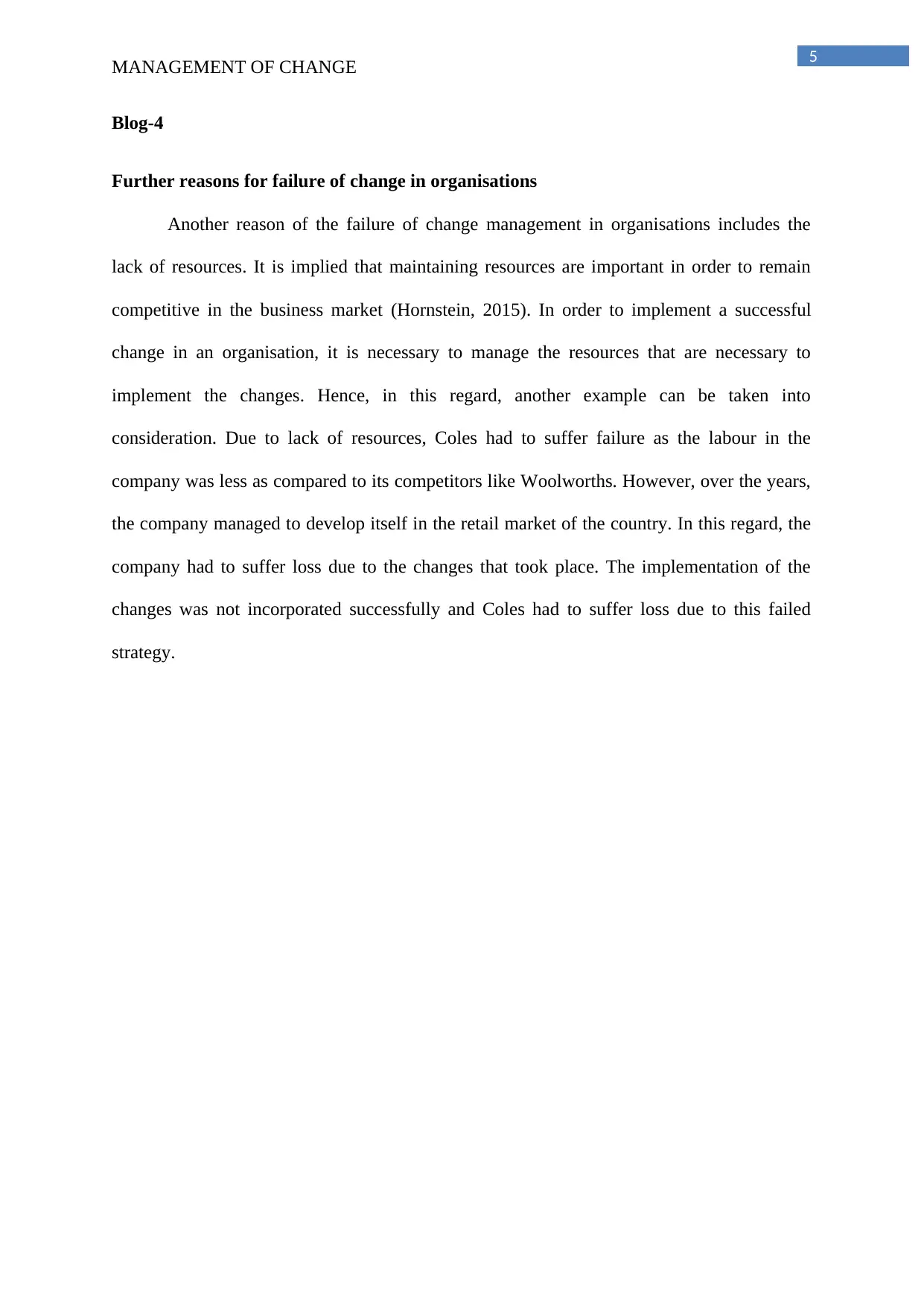
5
MANAGEMENT OF CHANGE
Blog-4
Further reasons for failure of change in organisations
Another reason of the failure of change management in organisations includes the
lack of resources. It is implied that maintaining resources are important in order to remain
competitive in the business market (Hornstein, 2015). In order to implement a successful
change in an organisation, it is necessary to manage the resources that are necessary to
implement the changes. Hence, in this regard, another example can be taken into
consideration. Due to lack of resources, Coles had to suffer failure as the labour in the
company was less as compared to its competitors like Woolworths. However, over the years,
the company managed to develop itself in the retail market of the country. In this regard, the
company had to suffer loss due to the changes that took place. The implementation of the
changes was not incorporated successfully and Coles had to suffer loss due to this failed
strategy.
MANAGEMENT OF CHANGE
Blog-4
Further reasons for failure of change in organisations
Another reason of the failure of change management in organisations includes the
lack of resources. It is implied that maintaining resources are important in order to remain
competitive in the business market (Hornstein, 2015). In order to implement a successful
change in an organisation, it is necessary to manage the resources that are necessary to
implement the changes. Hence, in this regard, another example can be taken into
consideration. Due to lack of resources, Coles had to suffer failure as the labour in the
company was less as compared to its competitors like Woolworths. However, over the years,
the company managed to develop itself in the retail market of the country. In this regard, the
company had to suffer loss due to the changes that took place. The implementation of the
changes was not incorporated successfully and Coles had to suffer loss due to this failed
strategy.
⊘ This is a preview!⊘
Do you want full access?
Subscribe today to unlock all pages.

Trusted by 1+ million students worldwide
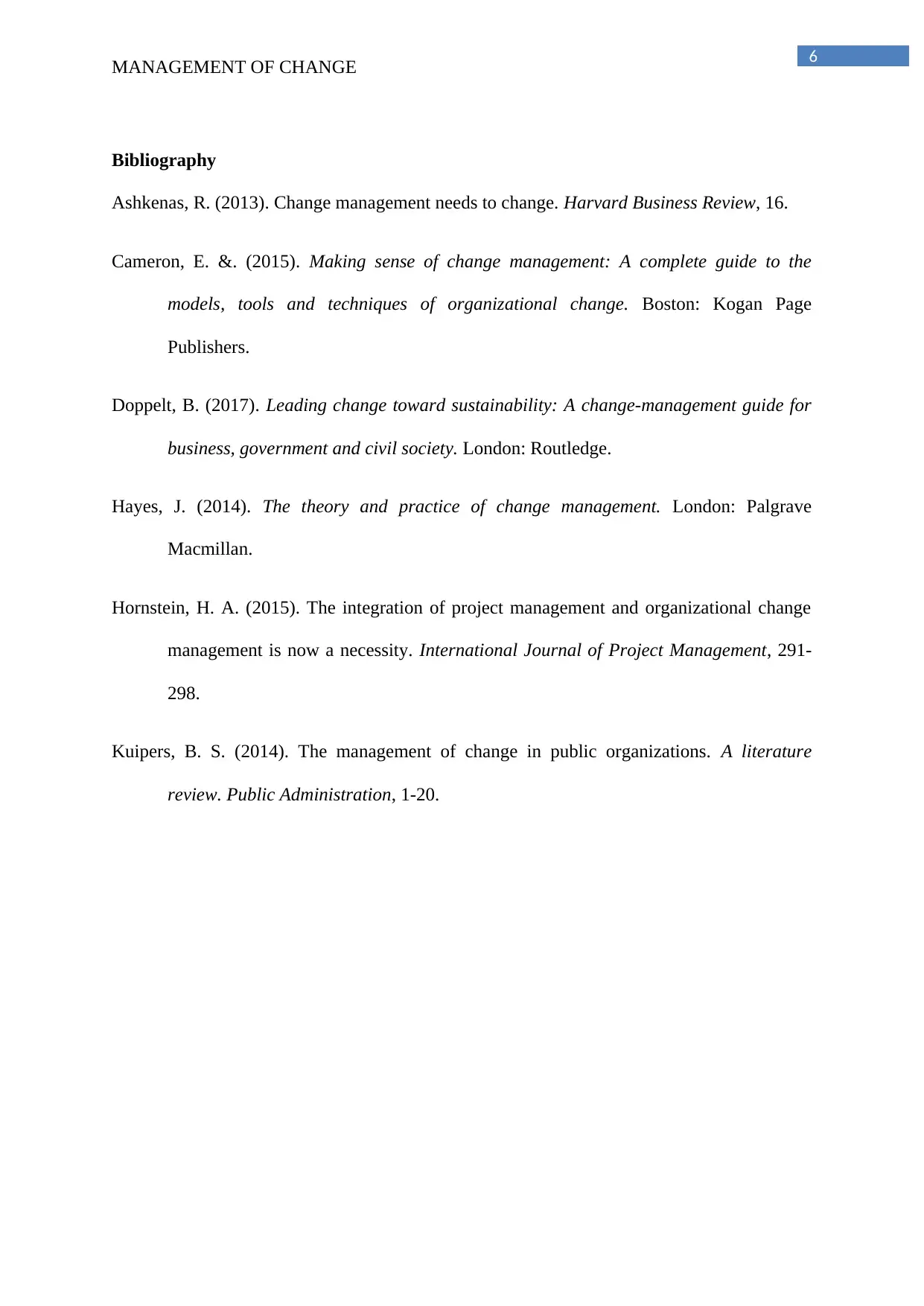
6
MANAGEMENT OF CHANGE
Bibliography
Ashkenas, R. (2013). Change management needs to change. Harvard Business Review, 16.
Cameron, E. &. (2015). Making sense of change management: A complete guide to the
models, tools and techniques of organizational change. Boston: Kogan Page
Publishers.
Doppelt, B. (2017). Leading change toward sustainability: A change-management guide for
business, government and civil society. London: Routledge.
Hayes, J. (2014). The theory and practice of change management. London: Palgrave
Macmillan.
Hornstein, H. A. (2015). The integration of project management and organizational change
management is now a necessity. International Journal of Project Management, 291-
298.
Kuipers, B. S. (2014). The management of change in public organizations. A literature
review. Public Administration, 1-20.
MANAGEMENT OF CHANGE
Bibliography
Ashkenas, R. (2013). Change management needs to change. Harvard Business Review, 16.
Cameron, E. &. (2015). Making sense of change management: A complete guide to the
models, tools and techniques of organizational change. Boston: Kogan Page
Publishers.
Doppelt, B. (2017). Leading change toward sustainability: A change-management guide for
business, government and civil society. London: Routledge.
Hayes, J. (2014). The theory and practice of change management. London: Palgrave
Macmillan.
Hornstein, H. A. (2015). The integration of project management and organizational change
management is now a necessity. International Journal of Project Management, 291-
298.
Kuipers, B. S. (2014). The management of change in public organizations. A literature
review. Public Administration, 1-20.
1 out of 7
Related Documents
Your All-in-One AI-Powered Toolkit for Academic Success.
+13062052269
info@desklib.com
Available 24*7 on WhatsApp / Email
![[object Object]](/_next/static/media/star-bottom.7253800d.svg)
Unlock your academic potential
Copyright © 2020–2026 A2Z Services. All Rights Reserved. Developed and managed by ZUCOL.



